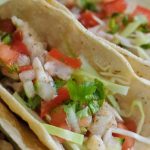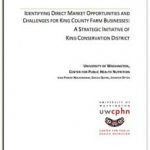Stories

New study to evaluate COVID-19 impacts on Washington State food security
May 4, 2020
As the COVID-19 pandemic unfolds, how and to what extent households are able to access food continues to change in the U.S. and across the globe. What are the impacts to our food supply and food security in Washington state? A new UW study funded by the University of Washington Population Health Initiative and the...
Read more
Jennifer Otten joins national committee that will examine food waste in the U.S.
August 2, 2019
Jennifer Otten, an associate professor in environmental and occupational health sciences and nutritional sciences in the UW School of Public Health has joined a new committee formed by the National Academies of Sciences, Engineering, and Medicine (NASEM), which will conduct a systematic review of consumer food waste and reduction efforts in the United States, and...
Read more
Are minimum wage policies likely to affect the food purchases of low-wage workers?
July 23, 2019
A new study from the University of Washington School of Public Health explores how workers in low-wage jobs connect food and diet to perceptions of health and well-being, and whether a wage increase might influence how they acquire food or the types of food they might purchase. Although many low-wage workers would like to use...
Read more
Getting fish to the table
June 6, 2019 | By Department of Environmental and Occupational Health Sciences
A UW study maps West Coast hot spots where surplus fish could help meet nutrition needs in vulnerable communities As a philosophy-student-turned-fishmonger, Zach Koehn often heard his customers talking about how healthy fish is—and how expensive it can be. Yet Koehn knew cheap fish were available. Some groups, including the Monterey, CA, fish company where...
Read more
King County small and mid-sized farms could benefit with direct marketing support, according to report
May 16, 2019
King County farmers who sell direct to consumers, restaurants, and institutions could benefit by receiving support for direct marketing resources, according to a new report last week by the University of Washington Center for Public Health Nutrition (CPHN). The study was sponsored by King Conservation District (KCD), a natural resources assistance agency authorized by Washington...
Read moreSo long, sodium: Researchers work with local school districts to prevent heart disease
March 20, 2019 | By Ashlie Chandler
The hallways and classrooms of Auburn Riverside High School may have been deserted on March 11, but the kitchen was abuzz as more than two dozen food service managers learned fresh approaches to creating healthy meals for students. With kids out of school for a staff development day, cooks from across the school district in...
Read more
Spot urine sodium-to-potassium ratio predicts stroke risk
February 20, 2019
In an analysis of data from the Multi-Ethnic Study of Atherosclerosis (MESA), UW researchers found that individuals with a urinary sodium-to-potassium ratio greater than 1 was associated with a significant 47% increased risk of stroke. A urine sodium-to-potassium ratio less than 1 may be related to a clinically relevant reduction in stroke risk and is...
Read more2018-2019 Health Sciences Common Book: Marbles
July 13, 2018
Marbles: Mania, Depression, Michelangelo, and Me by Ellen Forney Each year, the Health Sciences Service Learning and Advocacy Group selects a common book that will engage students from across the health sciences in substantive, interprofessional dialogue about pressing topics related to health equity and social justice. Students, staff, and faculty in the Schools of Dentistry, Medicine, Nursing, Pharmacy,...
Read moreRice Less Nutritious as CO2 Levels Rise – New Study Published
May 23, 2018
A study published today in Science Advances shows for the first time that rice grown at concentrations of atmospheric CO2 expected by the end of this century has lower levels of four key B vitamins. The findings from an international research team analyzed rice samples from field experiments started by a University of Tokyo professor....
Read moreSharon Feucht – 2018 Washington State Outstanding Dietitian of the Year
April 30, 2018
At their annual conference, the Washington State Academy of Nutrition and Dietetics (WSAND) honored Sharon Feucht, MA, RDN, CD with the Outstanding Dietitian of the Year Award for 2018. This award is the most prestigious recognition given by WSAND and highlights notable leadership, ability, and service. Ms. Feucht has been with the Nutrition section of...
Read more